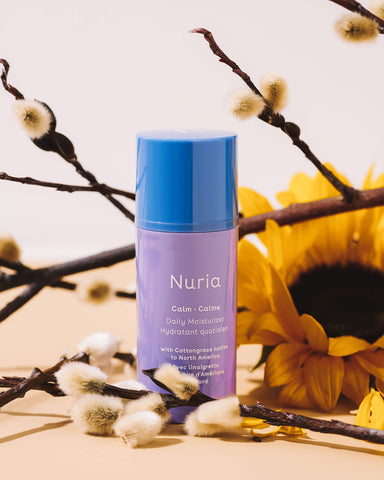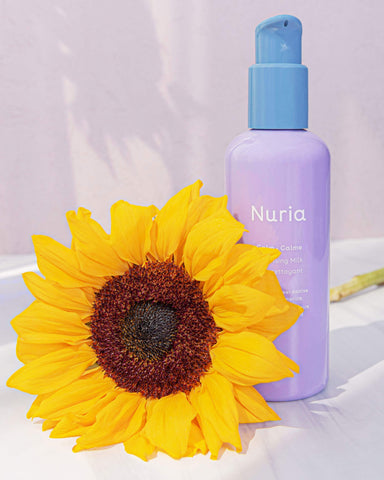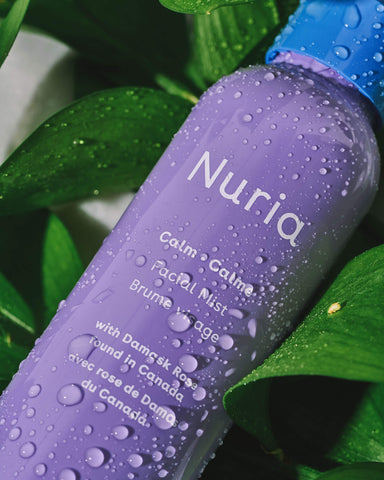
Caring for Sensitive Skin & Helping it Glow
Sensitive skin is so common, if you don’t suffer from sensitive skin, you probably know someone who does! In fact, more than half of the people surveyed around the world report that they experience moderate to severe skin sensitivity.
Here are some insights into the causes of sensitive skin and ways you can keep your skin comfortable and healthy.
How to Know if You Have Sensitive Skin?
First things first, what is sensitive skin? Is it a skin type like dry skin? At its most basic level, sensitive skin is skin that is easily irritated. Many people who have sensitive skin say they experience skin irritation such as itching, burning, stinging, tightness, and dryness, even if their skin never looks irritated. Often this discomfort happens after using skincare and household products, and typically only lasts a few minutes. You may have sensitive skin if you notice that you experience these types of discomfort, if your skin is prone to redness or bumps, if it often feels itchy or very dry, or if you experience reactions to fragrances or exposure to UV rays.
If you notice longer-lasting skin irritation, or you are concerned that you may have a more serious skin problem or allergic skin reaction such as eczema, rosacea, hives, or allergic contact dermatitis, it is always a good idea to see a dermatologist. When a dermatologist is diagnosing a sensitive skin condition, she/he looks for skin reactions like bumps and pustules, overly dry skin that causes pain, and skin blushing or flushing, but diagnosing sensitive skin can be difficult because of the many potential causes, from genetics and the immune system to contact with environmental allergens and other skin irritants.
Why Is My Skin So Sensitive All of a Sudden?
We’ve all been there. You try a new product in your skincare routine, and then you experience a sensitive skin reaction or allergic reaction and blame the reaction on everything in that product. The reality is the reaction is likely due to a specific ingredient or two. The challenge is that you might not know which ingredients are causing your skin to freak out, which may make you wary of trying something new - especially when it comes to sensitive facial skin.
The good news is that while caring for sensitive skin can be tricky, there are resources to help prevent irritated skin. The first step to addressing a skin issue and selecting the right skincare is looking for clean products that don’t include potentially irritating ingredients. There are a lot of different no-no ingredient lists, but one of the most trusted lists is the list of ingredients banned in the European Union. While the US FDA only bans 11 ingredients and Health Canada bans 500, a team of scientific experts in the EU has determined that more than 1300 ingredients are considered unsafe for skincare products and another 26 allergens need to be disclosed on all labeling. Avoiding these ingredients is a must-do, especially if you have sensitive skin.
Another important ingredient to scrutinize is fragrance in each skincare product you user – in the US, there is no requirement to disclose the components of a fragrance or to list the allergens that may be hiding in the fragrance. Be mindful of phrases like “all natural” – many naturals contain allergens that may be irritating to the skin! A great place to start is to look for brands, like Nuria, that meet the EU safety requirements and that don’t use any of the EU-listed allergens, even in their fragrances. Not all fragrances are created equally, so listen to your skin and pay attention to the products and brands that work for you.
Creating a Skincare Routine For Sensitive Skin
The same nerve endings that help you feel the soft fur of your puppy or the warmth of your morning cup of coffee also cause you to feel the itching and pain of sensitive skin. Overly dry skin and a damaged skin barrier can no longer effectively protect those nerves in your skin, making you more prone to feeling the pain of sensitive skin.
With a damaged barrier, irritants can more easily penetrate the skin, and the skin is less resilient to environmental aggressors like pollution, wind, and sun. So, a key strategy in caring for your sensitive skin is building a skincare routine that doesn't disrupt your skin barrier, but rather protects and strengthens it.
To protect your skin barrier, use a gentle cleanser to wash away impurities. Next, fortify your barrier with a good moisturizer, one that is free of those nasty ingredients and allergens. A good choice for sensitive skin is a moisturizer that is fragrance free and contains anti-redness and soothing ingredients like cottongrass, blue daisy, and oat, like our Calm Daily Moisturizer, an unscented product.
And finally, add a bonus product (or two) to your routine with a hydrator like the Hydrate Moisturizing Toner or our Hydrate Serum with sodium hyaluronate (hyaluronic acid) right after cleansing or the Calm Facial Mist anytime throughout the day to keep your skin supple and soothed. Keeping your skin moisture barrier healthy can also help with skin sensitivity. With the right sensitive skin care routine, you can have glowing skin while still protecting those sensitive skin nerves!
About the author, Jasmin Figueroa
Jasmin is an accomplished formulation scientist and skin health expert who has spent her career listening to consumers and developing products that rock. A founding member of the Nuria community, she loves traveling with her family, chilling with her friends at the beach, and will totally judge you if you don’t wear SPF.




